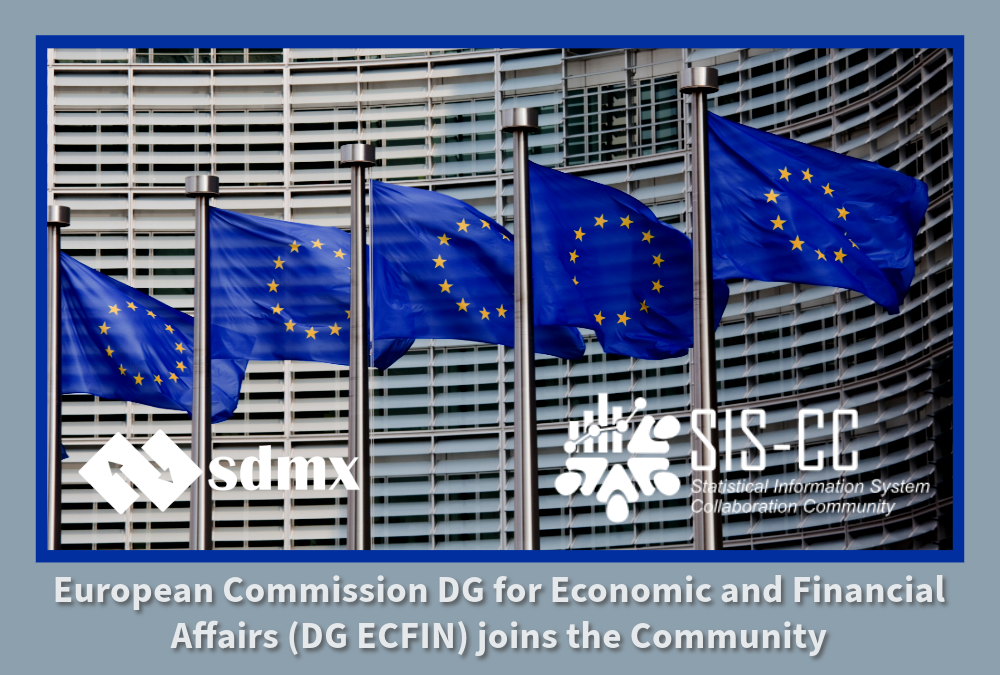
The European Commission’s Directorate-General for Economic and Financial Affairs (DG ECFIN) has officially joined the Statistical Information System Collaboration Community (SIS-CC), marking a significant milestone in global efforts to advance the SDMX standard. This partnership solidifies the position of the SIS-CC as a leading network of forward-thinking organisations dedicated to modernising statistical production and dissemination.
This decision follows the successful pilot project, conducted in partnership with the OECD, which allowed DG ECFIN to explore the capabilities of the .Stat Suite. By working with two key datasets: AMECO (DG ECFIN’s Annual Macro-Economic database) and BCS (Business and Consumer Surveys), DG ECFIN gained valuable insights into how to improve their data systems
“This project is an important step in deploying SDMX to support the whole data lifecycle, and not just the dissemination or reporting use cases. We look very much forward to the collaboration with DG ECFIN to develop their data platform based on the .Stat Suite, and learn from each other on novel data management practices based on SDMX.” Eric Anvar, Head of Smart Data, OECD
In this pilot, the teams established a dedicated .Stat Suite environment within the SIS-CC Cloud, receiving data modelling expert advice and training to align ECFIN data with SDMX standards. Through workshops and hands-on sessions, DG ECFIN learned how the OECD leverages self-developed R libraries to streamline the extraction, transformation, and reloading of data. The collaboration during the pilot paved the way for the transition into the SIS-CC Community, demonstrating the collaborative spirit that underpins both the pilot and DG ECFIN’s subsequent membership.
With DG ECFIN now officially part of SIS-CC, the Community gains an important ally in modernising official statistics. DG ECFIN brings extensive expertise in economic and financial data, further strengthening the collective know-how of SIS-CC members. This shared knowledge pool supports the continuous development and refinement of open-source solutions that can be adopted across diverse statistical domains.
“After almost three decades of operation, DG ECFIN needs to move its central macro-economic database AMECO to a new platform. Rather than just migrating to a more modern software platform, we look for a fundamental improvement in all stages of our data handling. That is why we have opted for comprehensive use of SDMX, for a systematic use of metadata in driving our processes, and for the re-use of existing solutions as far as possible. Joining the SIS collaboration community then seemed the right way forward for us, and we are looking forward to profiting from and contributing to the exchange in the network.” Ingo Kuhnert, Senior Expert, European Commission DG ECFIN
DG ECFIN’s membership formalises the collaborative journey initiated by the successful pilot project. As DG ECFIN and other members continue to share insights, technological developments, and best practices, the SIS-CC Community will remain at the forefront of innovation for official statistics. We look forward to the next chapter, as DG ECFIN contributes its expertise and experience to enhance and expand the open-source ecosystem built around the .Stat Suite.
The Directorate‑General for Economic and Financial Affairs (DG ECFIN) is the European Commission department responsible for EU policies promoting economic growth and recovery, higher employment, stable public finances and financial stability. DG ECFIN conducts economic forecasts and business and consumer surveys to underpin economic policy in the EU. It also coordinates the Commission’s work for a deeper and fairer Economic and Monetary Union (EMU), and promotes the role of the EU as a global actor in the economic arena. Finally, the Directorate-General is responsible for economic policy coordination, in particular through the European Semester, and safeguarding fiscal and financial stability in the EU.


